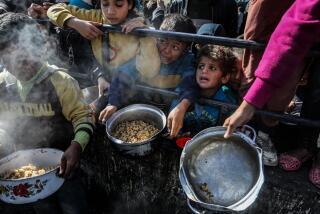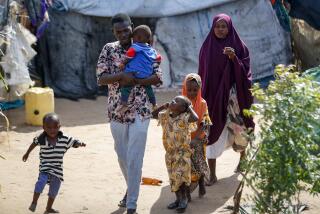Preparing to Wage War on Disease : Medicine: Lessons learned in the Persian Gulf conflict may protect U.S. troops in malady-ridden Somalia, military doctors say.
- Share via
A tough lesson learned in the early days of the Persian Gulf War--not about tactics or weapons but about lettuce and other vegetables--may save the troops in Somalia considerable misery.
The lesson occurred when some field commanders, taking pity on troops eating bland, prepackaged rations, accepted fresh vegetables bought in Egypt and other nearby countries. The result: Each week thousands of troops reported to sick call with diarrhea.
This time, Lt. Commander Kevin Hanson said, the rules of preventive medicine--including a ban on food from sources that have not been approved--will be closely followed.
“We are launching a world class public health effort with no holds barred,” he said.
It is necessary, he said, because the threat of disease has never been greater. Somalia has more serious indigenous diseases than Saudi Arabia or Vietnam, Hanson said. It lacks rudimentary sanitation. Piles of garbage attract flies and vermin. And the end of the monsoon season has left pools for breeding mosquitoes, which in that equatorial African country can transmit the world’s most deadly strain of malaria.
“We haven’t operated in as high a health threat zone since World War II,” said Hanson, a physician specializing in epidemiology who last week was at Camp Pendleton preparing to fly to Somalia. There he will head the preventive medical team assigned to keep U.S. troops healthy while they protect volunteers delivering food to starving Somalis.
Recognizing that disease could be a more deadly menace to troops than bullets in this effort, he said, the joint military command is determined that preventive medicine, which “did not have sufficient priority” in Desert Shield and Desert Storm, will this time.
Hanson said the military will be setting up a state-of-the-art medical laboratory in Mogadishu for diagnoses of ailing troops. Early diagnoses, he said, could help to prevent widespread outbreaks of disease.
A case of malaria, for instance, could warn that more thorough spraying of the camp with insecticide is required or that troops are neglecting to protect their beds with mosquito netting.
It is the first time, Hanson said, that the military has made such widespread use of an insecticide sprayed on uniforms which kills mosquitoes that land on it. The chemical lasts for five washings before it has to be reapplied. In addition, he said, the troops have been given a cream repellent to rub in their skin every 12 hours.
The Somalia military operation, he added, also will make the first extensive use of a new anti-malaria drug developed by the Army named Mefloquine. Hanson said the military made a substantial effort nationwide to procure enough of the drug, which is in short supply. He said that although Mefloquine costs substantially more than the Doxycyline pills traditionally used to prevent malaria, it is more effective, can be taken less frequently and is easier on the stomach.
Still, he said, “The No. 1 (rule) is don’t let a mosquito bite you.”
The same is true for sand flies, also prevalent in Somalia, said Lt. Rafael Del Vecchio, a Navy entomologist who was preparing Thursday to join the preventive medical task force in that country.
Sand flies carry a parasite that causes Leischmaniasis, a disease that can attack internal organs. The flies contract the parasites from biting rats, which are common in port cities like Mogadishu.
Before leaving for Somalia, military personnel received a series of inoculations for influenza, polio, yellow fever, typhoid, meningitis, measles, tetanus and hepatitis.
“But vaccines are not 100% effective, so other precautions must be employed,” Hanson cautioned.
A military briefing paper says that the most common disease threat is “travelers’ diarrhea” caused by certain bacteria. Other health problems most likely to affect the troops include dehydration from working in the extreme heat, typhoid fever and hepatitis.
“Virtually 100% of the (Somali) population has had hepatitis A as a child,” which can be easily transmitted through contaminated food and water. Many natives also have hepatitis E, for which there is no known vaccine and which can put a sailor, soldier or Marine out of commission for 30 days or more.
Another concern, Hanson said, will be to keep the field kitchens clean and to carefully monitor all food that the troops eat. In Third World countries, he noted, lettuce and other vegetables usually are too contaminated for troop consumption because they have been fertilized with human waste.
“We would rather have them eat MREs (Meals, Ready to Eat) for a month,” rather than accept food from sources that have not been approved, Hanson said.
Hanson said that if no precautionary measures were taken by American troops in Somalia, an estimated 50% to 75% would fall ill.
But if everyone pays close attention to the rules, he says, the weekly incidence of diarrhea could be cut to fewer than one case per 200 troops, while the incidence of new malaria and hepatitis cases could be limited to one per 10,000.
More to Read
Sign up for Essential California
The most important California stories and recommendations in your inbox every morning.
You may occasionally receive promotional content from the Los Angeles Times.













